Position: Home> Media Center > Events

July 6, 2024, a Series of Events on Cultivating Outstanding Engineers from a Global Perspective kicked off at Ziqing Building, Tsinghua University. The events are jointly and hosted by the International Centre for Engineering Education under the auspices of UNESCO (ICEE) and the National Graduate College for Engineers, Tsinghua University, and supported by the Chinese Society of Engineers (CSE). International guests and professionals gathered for in-depth exchanges and discussions on the theme of the first event, “AI Empowering Energy Transition for Sustainable Development”.
Shahbaz Khan, Director of the UNESCO Beijing Office, YUAN Si, former Vice President of Tsinghua University and Executive Director of ICEE, and Hans J. Hoyer, Secretary General of the International Federation of Engineering Education Societies (IFEES) and Executive Director of Global Engineering Deans Council (GEDC), delivered speeches and expressed their support and expectation for the event. WANG Sunyu, Deputy Director and Secretary General of ICEE and professor of the Institute of Education, Tsinghua University, presided over the opening ceremony.
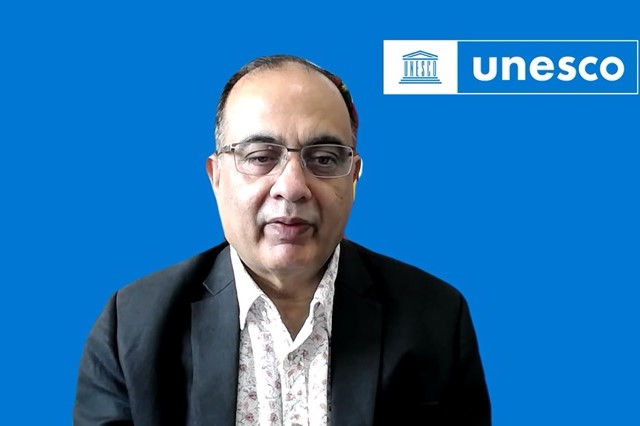
Shahbaz Khan delivering a speech
Shahbaz Khan highly praised the innovative spirit of engineers in creating a new world, noting that AI technology is completely changing the energy sector by optimizing systems, improving efficiency, and promoting the integration of renewable energy. He also mentioned China’s important role in supporting sustainable development in Africa and the role of the Belt and Road Initiative in promoting critical infrastructure development on the continent. He called on the wols to jointly advance the work with more sensible and sustainable strategies and bring about far-reaching and positive global changes through engineering innovation and international cooperation.
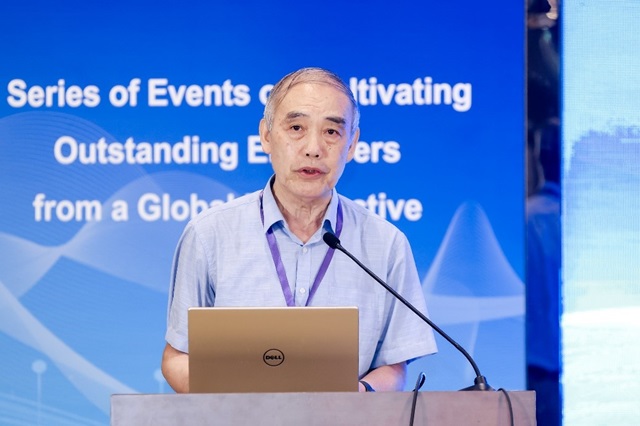
YUAN Si delivering a speech
YUAN Si pointed out the key role of engineers in promoting energy transition and achieving the Sustainable Development Goals. According to him, it is necessary to advocate the cultivation of outstanding engineers with global vision, social responsibility, and innovative spirit, especially in the construction of engineering capacity in developing countries. He said that Tsinghua University has made unremitting efforts to promote innovation and progress in engineering education, and ICEE has made remarkable achievements in promoting the global sharing of high-quality engineering resources and deepening international cooperation. He particularly pointed out the positive progress in online education and in increasing the participation of female engineers and looked forward to joining hands with global partners to meet energy and environmental challenges.
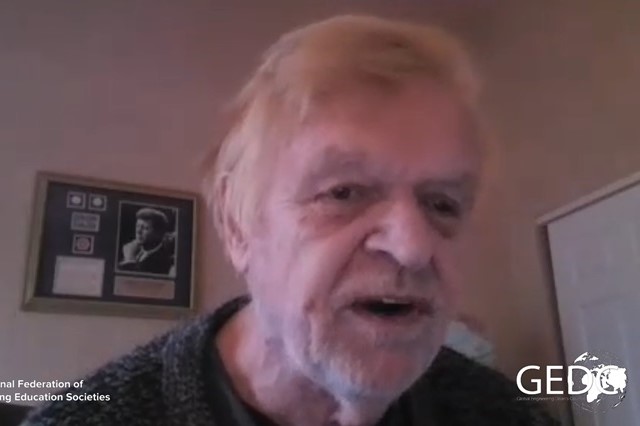
Hans J. Hoyer delivering a speech
Hans J. Hoyer said that the world is currently facing severe challenges of climate change and ecological crisis, and advocated that engineers and social science experts should join hands to explore cutting-edge design for sustainable development. According to him, engineers and experts have great power to shape the ecological value of industries, the economy, and even the whole society. He called on scientists, engineers, and governments to work together to cultivate the next generation of engineers and policymakers, to realize the transition towards a sustainable future.
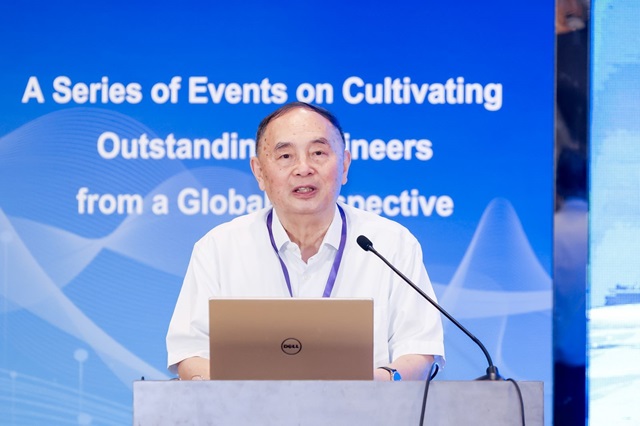
WANG Sunyu presiding over the event
During the keynote speech session, relevant experts shared their research or practices on cultivating outstanding engineers. They are LING Wen, a member of the Chinese Academy of Engineering (CAE) and Chairperson of the Shandong Association for Science & Technology, CAI Wei, a winner of National Outstanding Engineer and a professor of Harbin University of Science and Technology, YE Haowen, a winner of National Outstanding Engineer and a chief expert of China Construction Science & Technology Group Co., Ltd., WU Xiaolin, former President of China University of Petroleum (Beijing), Jürgen Kretschmann, former President of Bochum University of Applied Sciences and President of Hainan Bielefeld University of Applied Sciences, LIU Yunpeng, Vice President of North China Electric Power University (LIU Chongru, Director of the Office of Academic Affairs, North China Electric Power University, reported on his behalf), and LIANG Qionglin, Vice Provost of Tsinghua University, Dean of the Graduate School and Executive Director of the National Graduate College for Engineers, Tsinghua University. These efforts are essential to cultivate outstanding engineers and unleash the potential of new quality productive forces, especially in the key areas of promoting energy transition and sustainable development with AI.
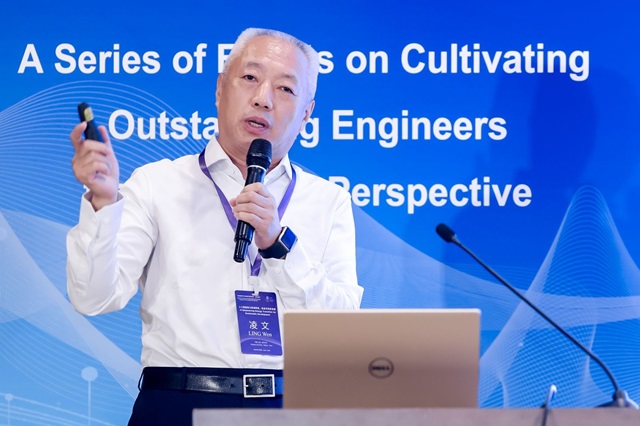
LING Wen delivering a report
LING Wen delivered a report entitled “Talent Cultivation and International Cooperation in the Engineering Context”. He pointed out that China, as a major engineering country, attaches great importance to the training of engineers, and has specially established the National Engineer Award to recognize engineers for their outstanding achievements in their respective fields. He also mentioned that the United Nations encourages young people to become active participants in the U.N. 2030 Agenda for Sustainable Development, and engineers play a vital role in achieving this agenda. China has played a core role in promoting South-South cooperation and China-Africa cooperation, facilitating mutual benefit and win-win results among developing countries. Through the support of technology, talents, and capital, China and Africa have achieved complementary advantages in labor and natural resources, and jointly promoted the development of both sides.
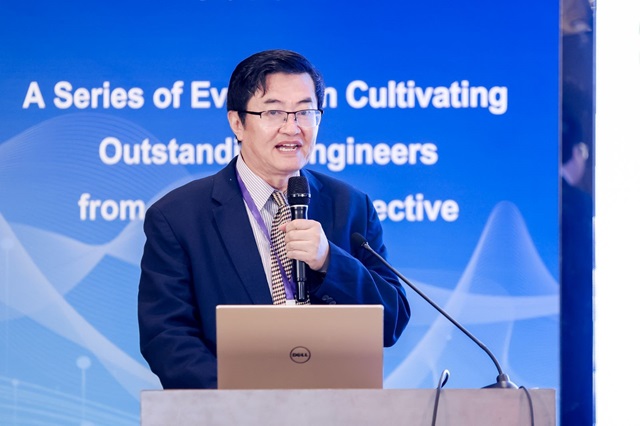
CAI Wei delivering a report
CAI Wei gave a report entitled “Cutting-edge Technology Trends and Talent Training Needs of New Energy Vehicles”. He pointed out that with the development of clean electricity and the electrification of automobiles, engineers should have professional knowledge, global vision, and innovative spirit. In particular, he mentioned China’s strategic layout in the fields of electrification, intelligentization, and decarbonization, as well as its emphasis on breakthroughs in electric drive technology for new energy vehicles.
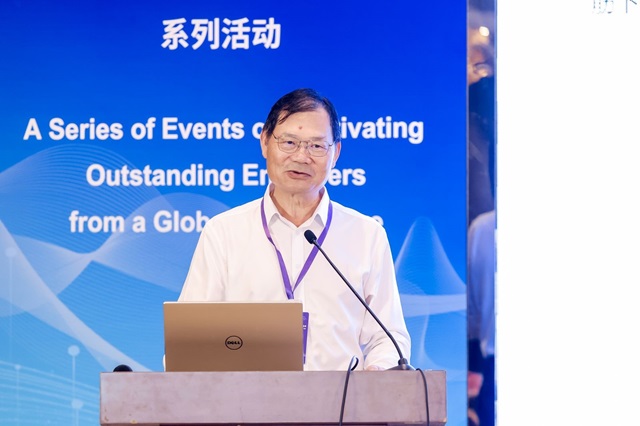
YE Haowen delivering a report
YE Haowen delivered a report entitled “AI Empowers Green Construction: Science and Technology Lead the Sustainable Development of the Construction Industry”. He pointed out that AI technology combined with the concept of green construction is driving the construction industry to develop in an intelligent, efficient, and sustainable direction. AI plays an important role in all stages of the building life cycle and contributes to the transformation and upgrading of the construction industry by optimizing solutions, improving construction quality and accuracy, and predictive maintenance.

WU Xiaolin delivering a report
WU Xiaolin gave a report entitled “Re-imagining the Future of Education — An Approach to Cultivate Engineering Talents in China”. Taking three universities including the Science and Technology Backyard of China Agricultural University as examples, she shared the innovative practices and prospects of engineering education in China, and stressed the importance of scientific engineering education, serving industrial development, and "returning to engineering". She proposed that engineering education needs to undergo a profound transformation in training modes and educational structures, to meet the challenges arising from technological progress and educational equity.

Jürgen Kretschmann delivering a report
Jürgen Kretschmann delivered a report entitled “Innovating Engineering Education for a Better Future”. He analyzed the advantages of engineering education in Germany, especially the efforts made in combining theory with practice and in arranging early internships. He emphasized the close relationship between education and the Sustainable Development Goals, as well as the importance of providing students with a stable and socially responsible working environment.
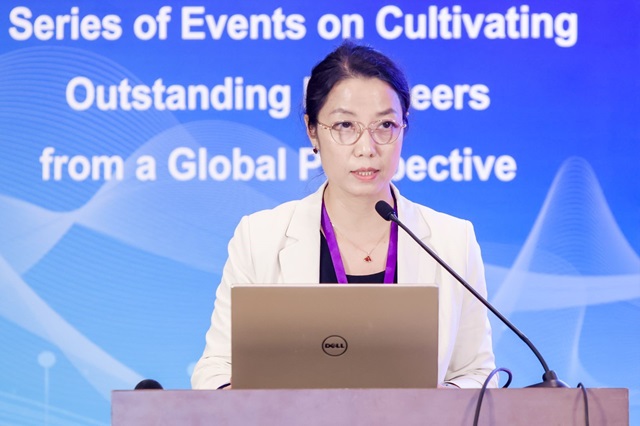
LIU Chongru delivering a report
LIU Chongru gave a report entitled “Shouldering the Mission of Dual Carbon Era and Cultivating Outstanding Power Talents”. She introduced the remarkable achievements made by North China Electric Power University in discipline construction, talent training, scientific and technological innovation, and university-enterprise cooperation. The university has established a new energy and power discipline system and a three-dimensional integrated talent training model, promoted the integration of industry and education, and improved the quality of talent training through scientific research, to contribute to building China into an energy power.
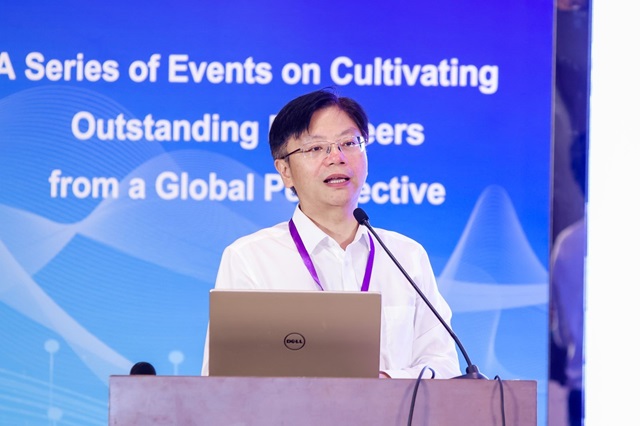
LIANG Qionglin delivering a report
LIANG Qionglin gave a report entitled “Shouldering the Mission and Accelerating the Cultivation of Outstanding Engineers”. He emphasized the importance of accelerating the training of outstanding engineers and introduced the development history of engineering education at Tsinghua University and the new mechanism of talent training featuring the integration of industry and education. He said that outstanding engineers should have profound knowledge, a systematic problem-solving ability, as well as engineering technology innovation spirit and leadership to support global sustainable development and enhance the independent innovation capabilities of developing countries.
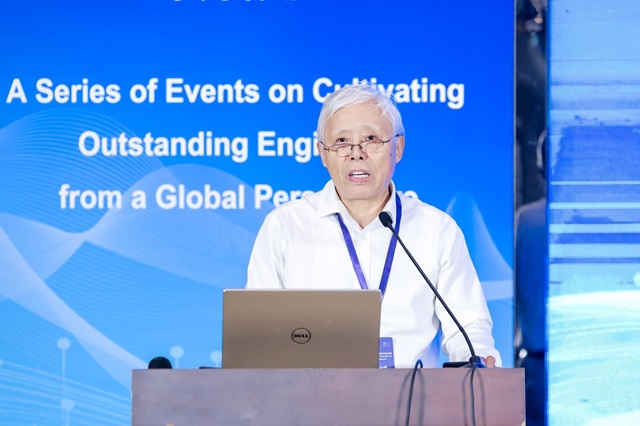
KANG Jincheng presiding over the special dialogue
The special dialogue session on engineering capacity building in developing countries included two topics, i.e. “International Cooperation and Training of New Energy Engineers” and “New Challenges in Engineering Capacity Building in Developing Countries”. The dialogue was hosted by KANG Jincheng, a distinguished expert of ICEE and former Director of the International Cooperation Bureau of CAE.
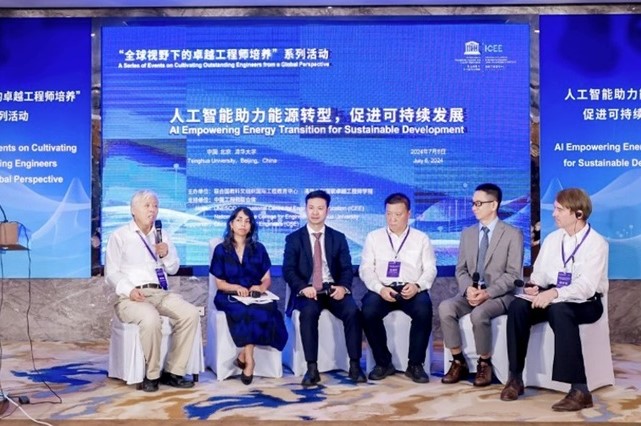
Group Photo of the Special Dialogue on “International Cooperation and Training of New Energy Engineers”
YANG Zhiyuan, General Manager of the Middle East Regional Management Center of China Harbour Engineering Company Limited (CHEC), WANG Yubiao, Chairman of FXB CO., LTD. in Shenzhen, and CHEN Jiquan, Chairman of Yalong Intelligent Equipment Group Co., Ltd., respectively gave reports entitled “CHEC’s Market Operation Practice in the Middle East”, “Building a Technical Talent Training Base Together with Developing Countries by Leveraging China’s Industrial Upgrading”, and “Outstanding Engineer Training from an Entrepreneur’s Perspective”. They also discussed “International Cooperation and Training of New Energy Engineers” with the panelists Rubbina Karruna, Development Counsellor at the British Embassy in Beijing, and Jürgen Kretschmann. The guests believed that international cooperation and technical exchanges are crucial in building engineering capacity, especially in developing countries. Through cooperation with international enterprises, Chinese engineers can not only improve their skills but also contribute to the international market. Practice has proved that industry-university cooperation, capacity building, and technological leapfrogging are the keys to cultivating a new generation of engineers.
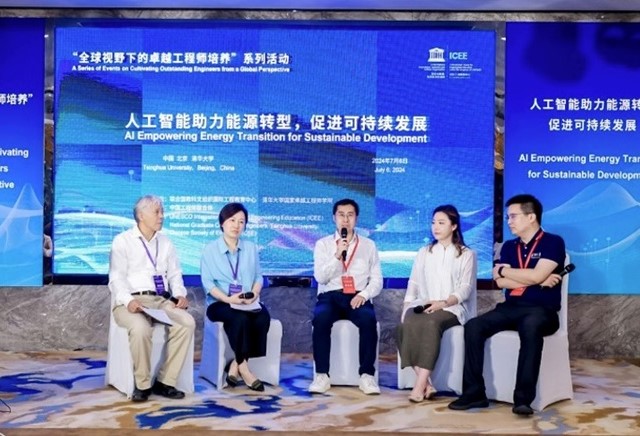
Group Photo of the Special Dialogue on “New Challenges in Engineering Capacity Building in Developing Countries”
LI Xia, Chairman of Shenzhen Power-Solution Ind Co., Ltd. (SU Liya, Assistant to Chairman, spoke on her behalf), and ZHU Dan, CEO of WindMagics International Limited, respectively gave reports entitled “Striking Deep Roots in Africa’s Local New Energy Ecology to Contribute to its Long-term Development” and “Development and Challenges of Renewable Energy Infrastructure Developers in Southeast Asia”. They also discussed “New Challenges in Engineering Capacity Building in Developing Countries” with the panelist’s LI Pengfei, Deputy Director of the General Affairs Department of China National Nuclear Corporation Overseas Ltd. (CNOS), and YAO Weili, Manager of China National Coal Group Corporation. The guests stressed the urgency of international cooperation and engineering capacity building in the energy field and the role of a global vision in addressing global energy and environmental issues. They advocated interdisciplinary, cross-institutional, and cross-cultural cooperation, as well as the integration of diverse cultures in engineering practice.
The event was honored to invite 150 on-site guests and attract more than 100 online viewers. It provided new impetus for deepening the United Nations Sustainable Development Goals and built a valuable communication platform for experts and scholars in engineering education and industrial professionals. This platform not only promotes in-depth international cooperation but also helps to optimize and upgrade the system for training outstanding engineers, thus contributing to achieving the grand goal of global sustainable development.
 京公网安备 110402430053 号
京公网安备 110402430053 号